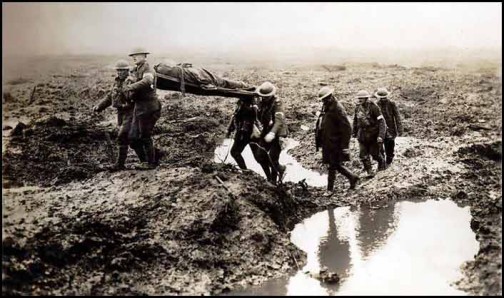Ricochet is the best place on the internet to discuss the issues of the day, either through commenting on posts or writing your own for our active and dynamic community in a fully moderated environment. In addition, the Ricochet Audio Network offers over 50 original podcasts with new episodes released every day.
 Remembrance Day Weather: Rain in France
Remembrance Day Weather: Rain in France
 The official observances in France, were under rain. Indeed, the rains were heavy enough to repeatedly interfere with the satellite TV transmission signal back to C-SPAN. You see that in the multi-national ceremony and in President Trump’s address at a war memorial for Americans. The rain, and the disruption, is so appropriate to the commemoration of a war in which men lived in muddy trenches, never really dry, for years. Feet, constantly wet, started disintegrating. It was called “trench foot” and is called “immersion foot syndrome.” [Emphasis added.]
The official observances in France, were under rain. Indeed, the rains were heavy enough to repeatedly interfere with the satellite TV transmission signal back to C-SPAN. You see that in the multi-national ceremony and in President Trump’s address at a war memorial for Americans. The rain, and the disruption, is so appropriate to the commemoration of a war in which men lived in muddy trenches, never really dry, for years. Feet, constantly wet, started disintegrating. It was called “trench foot” and is called “immersion foot syndrome.” [Emphasis added.]
Trench foot, or immersion foot syndrome, is a serious condition that results from your feet being wet for too long. The condition first became known during World War I, when soldiers got trench foot from fighting in cold, wet conditions in trenches without the extra socks or boots to help keep their feet dry.
Trench foot killed an estimated 2,000 American and 75,000 British soldiers during WWI.
We all love a bright sunny day and want the soldiers, who must parade, to have a pleasant day, while we watch them at their best. We all enjoy images of Flanders Fields clothed in bright red poppies. Yet, this day, perhaps God laughed at mens’ plans, and maybe the heavens wept for the millions dead and maimed.
The bags across the soldiers’ chests, in the photographs below, contain their gas masks. The uneven terrain, in the second photograph, was the result of such intense and repeated artillery bombardment as to turn the face of the earth into that of a golf ball, completely dimpled. Today, the land, if not developed, is coated in green, but still shaped by shell holes, so deep and numerous as to not yet be erased by the passage of 100 years. So, the weather in France, on 11 November 2018, was perfect for the occasion.







My understanding of the encampments of Valley Forge in the US war of independence changed when we visited in November during a sleeting rain. In that sleeting rain it was easier to picture the Continental Army encamped for the winter with inadequate shelter, inadequate clothing, inadequate food, etc. than it had been when I had previously visited on a nice sunny summer day.
We get a lot of choice in when and how we visit history. Those who are making it often don’t have that choice.
Yes, I also visited Dachau on a dreary winter day and walked thru the “parade” grounds in a driving sleety rain. And was immediately humbled and embarrassed that I was huddling into my Gortex ski parka, hood up, in an attempt to keep the elements at bay. This in contrast to the pictures of the Jews who had to stand at attention for hours in thin, black and white striped cotton shirts. The horrors endured and perpetrated there are difficult to grasp, and scary to imagine. We allow ourselves brief moments where we honor those heroes and victims, and proclaim daily platitudes of “thanks for your service” to those in uniform. But for the most part we emotionally compartmentalize the raw terror and horrific conditions endured by those people. Because to really think about what war is like, is far too difficult to seriously contemplate on a daily basis.